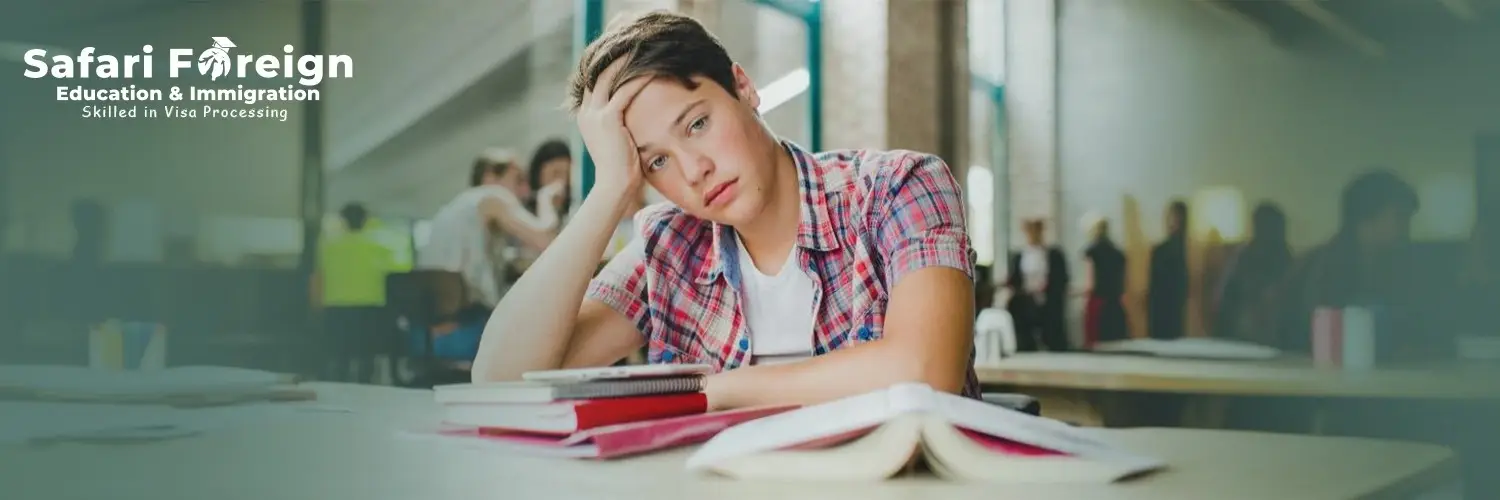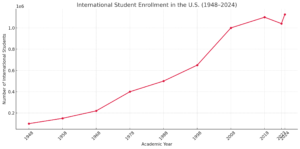
Top Student Visa Rejection Reasons in 2025 and How to Avoid Them
Planning to study abroad can be an exciting journey, but for many students, the process is often halted with a disappointing visa rejection. During the 2023–24 fiscal year (October 2023 to September 2024), the U.S. recorded its highest F-1 student visa rejection rate in ten years, rejecting 41% of applications. However, in 2024, international student enrollment in U.S. colleges and universities—including those participating in Optional Practical Training—reached a record high of 1,126,690, marking a 7% rise from the previous year.
As 2025 sees a surge in international student applications, understanding why these rejections happen and how to avoid them is more critical than ever.
Trend of International Student Enrollment in US

This line graph represents the growth trend in the number of international students studying in the United States over several decades. Starting from just over 100,000 in 1948, enrollment has steadily increased, reaching over 1.12 million in the 2023/24 academic year — the highest in U.S. history.
Key Highlights:
- Sharp growth post-2000 due to globalization and rising interest in U.S. education.
- A dip around 2020–2022, likely due to the COVID-19 pandemic and visa restrictions.
- A 7% increase in 2023/24, shows strong recovery.
Top Reasons for Student Visa Rejection
Let us now explore the main visa rejection reasons and actionable ways to increase your chances of approval.
1. Lack of Financial Proof
One of the most common reasons for student visa rejection is the inability to prove financial stability. Embassies want to ensure that students have enough funds to support their tuition and living expenses abroad.
Did You Know? According to ICEF Monitor, many countries have increased the minimum financial threshold students must demonstrate in 2025, causing a sharp rise in rejections for applicants from developing nations.
How to Avoid It:
Submit official bank statements, income tax returns, and evidence of regular income from sponsors. Ensure the funds meet or exceed the embassy’s requirement for your intended duration of stay.
2. Weak or Generic Statement of Purpose (SOP)
A poorly written SOP is a deal-breaker. Embassies use it to evaluate your intent, educational goals, and career plans. If your SOP appears vague, copied, or lacks personal motivation, your application may be declined.
How to Avoid It:
Craft a strong, personalized SOP. Clearly outline your academic background, reasons for choosing the course and university, and your long-term goals. Show how studying abroad aligns with your future aspirations.
3. Incomplete or Incorrect Documentation
Even a minor mismatch in your documentation can lead to an immediate visa refusal. Missing academic transcripts, expired passports, or inconsistent information across documents raise red flags.
How to Avoid It:
Double-check your checklist. Submit updated and consistent information across all your forms and attachments. Get your documents verified by an expert before submission.
4. Insufficient Language Proficiency Scores
Many countries require a minimum IELTS, TOEFL, or equivalent language proficiency score. Failing to meet these criteria is one of the key reasons for visa rejections, especially for English-speaking countries.
How to Avoid It:
Understand your target country’s score requirements. Prepare and retake the test if needed. Don’t forget to send your official scores directly to the university and embassy when required.
5. Suspected Immigration Intent
If the visa officer suspects that you’re using a student visa as a gateway to immigration, your application may be denied. This is particularly common in countries with strict immigration policies.
How to Avoid It:
Avoid giving any hint that you don’t plan to return home. Be clear about your ties to your home country—family, job prospects, or business connections—and emphasize your return intentions after studies.
6. Previous Visa Rejections or Overstays
Your past visa history significantly impacts your current application. A previously rejected visa or overstaying a previous visa can lead to a fresh rejection.
How to Avoid It:
Be transparent. Declare any previous rejections and provide clarification if asked. Avoid overstaying any visa and ensure your travel history reflects credibility.
7. Common Mistakes in Visa Applications
Even students with strong academic backgrounds often make small errors—like incorrect dates, incomplete answers, or failing to explain study gaps.
How to Avoid It:
Have a professional or experienced advisor review your application. Use a detailed checklist to avoid missing critical fields or documents.
How to Improve Visa Approval Chances
- Start Early: Don’t rush your application. Begin preparing at least six months before your intended intake.
- Use a Reputed Consultant: A qualified consultant helps identify weak areas in your application.
- Stay Honest: Avoid fabricated documents or false statements.
- Stay Updated: Visa rules change often. Stay informed about the latest requirements for your destination country.
Visa Rejection Letter: What It Really Means
Visa rejection letters often contain vague statements like “your intentions are not clear” or “insufficient documentation.” It’s crucial to read between the lines. These are not final judgments of your ability, but flags that something needs fixing.
Always request a copy of the visa refusal reason (where allowed), and use it to strengthen your next application.
Safari Foreign Education has helped hundreds of students successfully study abroad with personalized counseling, document support, and expert application services. With years of experience, Safari understands the complexities of visa approvals and offers hands-on support to reduce study visa rejection from Pakistan.
Planning to study abroad?
Final Thoughts
Student visa rejections can be demotivating, but they’re often avoidable with proper planning and expert guidance. By understanding these top reasons and preparing accordingly, you can significantly improve your chances of success.
Looking for expert help with your student visa application? Reach out to Safari Foreign Education today and turn your study abroad dream into a reality.
Frequently Asked Questions (FAQ)
Q1. Why do student visas get rejected even with strong academic records?
Academic strength alone isn’t enough. Visa officers assess financial backing, intent, and proper documentation.
Q2. What is the top reason for visa rejection due to insufficient funds?
Lack of clear bank statements or sudden large deposits without explanation often trigger suspicion.
Q3. Can I reapply after a visa rejection?
Yes, you can. Address the reasons stated in the rejection letter, fix your documentation, and apply again with improved documents.
Q4. Do visa rejections affect future applications?
Yes, especially if you hide them. Always declare previous rejections and explain them if needed.
